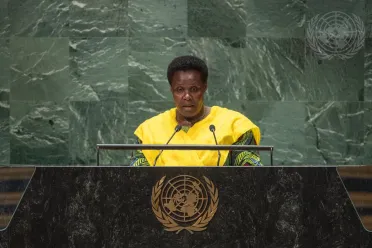Statement
Statement summary
JESSICA ALUPO, Vice-President of Uganda, said that her country remains committed to Security Council reform, both to make the organ more representative and to “address the historical injustices committed against the people of Africa”, as enshrined in the Ezulwini Consensus and Sirte Declaration. She also urged the international community to reflect on the United Nations’ original purposes and to work to resolve global insecurity through cooperation, diplomacy and peaceful means. For its part, Uganda continues to work with partners to eliminate terrorism, mistrust and other conditions that undermine development. Further, Kampala remains actively involved in regional initiatives, particularly those of the African Union, the Intergovernmental Authority on Development (IGAD), the East African Community and the International Conference on the Great Lakes Region. “Our involvement is based on the fundamental values of multilateralism,” she said.
She went on to report that Uganda has received many refugees from within the region. The Government is committed to shouldering its responsibility in addressing the plight of refugees as a “pioneer” of the progressive refugee policy outlined in the comprehensive refugee response framework, she said, calling on Member States and stakeholders to commit to initiatives that advance the sharing of burdens and responsibilities. She also pointed out that her country’s approach to human rights is to respect other people’s values, stating that “we expect others to respect our values, which are deep-rooted in our culture”. As such, human-rights considerations — especially in the face of varying cultural values — should not become the moderating factor in long-term development partnerships. On gender equality, she noted that almost 35 per cent of parliamentary and executive seats are held by women and that Uganda has embarked on poverty-alleviation programmes targeting the participation of women and youth in the economy.
Stressing that climate change continues to undermine all nations’ ability to achieve the Sustainable Development Goals, she expressed concern that countries contributing little to global greenhouse gas emissions continue to be disproportionately affected by the impacts of climate change. Uganda, for its part, works to increase access to affordable, reliable, sustainable and modern energy to enhance production and value-addition; to increase forest and wetland cover; and to operationalize climate-smart agriculture. For their part, she called on developed countries to fulfil their commitment, in line with the Paris Agreement, to provide $100 billion — annually, through 2025 — to developing countries to assist with mitigation and adaptation. Also expressing concern over increasing biodiversity loss, she detailed national efforts in response, including restoring degraded wetlands and prosecuting those involved in illegal activities that undermine the preservation of flora and fauna.
She also recalled that the COVID‑19 pandemic presented a multitude of challenges to global health systems and essential health services, which reversed hard-fought health gains and inflicted severe economic hardships — “especially in developing countries like Uganda”. Spotlighting widespread job loss, disrupted supply chains, decreased foreign investment and increased poverty, she underscored that these economic setbacks further exacerbate existing challenges to meeting the 2030 Agenda. However, despite this, Uganda has implemented effective disease-control measures, demonstrated by its swift, successful response to the Ebola outbreak. Adding that South-South cooperation remains a strong element of international cooperation, she said that her country will continue supporting such cooperation and that it looks forward to welcoming the leaders of the “Group of 77” developing countries and China for the Third South Summit in Kampala in January 2024.
Full statement
Read the full statement, in PDF format.
Photo

Previous sessions
Access the statements from previous sessions.
